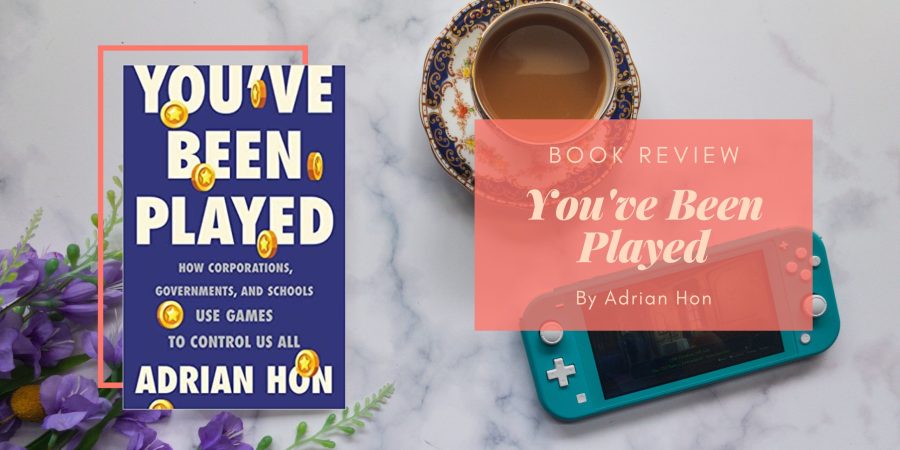Even before I read this book, I knew that I am someone who’s the prime target for a gamified life. After all, I spent months trying and failing to get the motivation to re-start exercising regularly. But after I bought a second-hand Apple Watch and downloaded the Lumi app, I started going to the gym. Now, I am on the treadmill somewhat regularly and I’ve earned $30 thanks to the collaboration between Singapore’s government and Apple.
I guess you can put a price on my health.
Clearly, I’m not the only one. In You’ve Been Played, Adrian Hon identifies the many ways that our lives have been gamified, often using was a generic form of gamification. As Hon defines it, generic gamification is the “application of points, leaderboards, achievements, progress bars, and challenges to diverse, digitally tracked activities” and while not the only form of gamification, is the most widely used type. Why is it so popular? Well it’s easy to implement, it allows for automatic and instant judgements, and people think that it works (even though behaviourism has been discredited).
And honestly, I can attest to how easy it is to let these apps just take over your life. I spent the last week doing far more Duolingo practice than before, even though I dislike the new interface, purely because I was in the final stage of the diamond league (so far their highest leaderboard) and I didn’t want to lose. That’s it. I didn’t want to lose and therefore I made myself play. I’m not sure if all that French and Bahasa Indonesia practice will pay off eventually, but this does show how pervasive generic gamification is and how addictive it can be.
While I’m lucky that all the gamification pain in my life is self-inflicted, it isn’t always the case. After taking us through the many ways apps use gamification to “level up our lives”, Hon tackles the problem of gamification at work. Amazon, for instance, tries to integrate games into its fulfilment centres, such as a game where you “race one-on-one as flying dragons against a nearby worker.” These games may relieve the tedium of work for a while, but it soon becomes nothing more than a way to track a worker’s productivity. And perhaps even more dangerously, it could affect income. There are challenges, such as those by Uber, where quests and challenges result in monetary bonuses, which in turn have drivers working for as long as possible. When these bonuses make up a significant part of your income, they’re no longer optional.
You might think that after Hon covers the gamification of work and personal life, the book has exhausted its topic, but you would be wrong. You’ve Been Played goes beyond the obvious examples of gamification. Hon explores the gamification of games, where loot boxes build gambling habits. He looks at the gamification of our behaviour, the mixed success of China’s various social-credit schemes, and also its American counterpart. According to a 2020 podcast called According to Need, homeless people are ranked based on an assessment and prioritised accordingly for housing – does that remind you of how a game leaderboard might work?
And of course, there are conspiracy theories. Qanon gets a chapter to itself, as Hon looks at an ARG he helped to run and its similarities to Qanon. I understand where he’s coming from; the first fiction podcast I was into was based on an ARG and the thought of the universe sending clues and important truths to those who are smart enough to understand is a seductive one.
It is easy, after all this, to think that we are doomed to a life on a hamster wheel, where leaderboards track and incentivise our every move. However, the last chapter on escaping softlock is a hopeful one, talking about how game designers can create ethical gamification. It complements an earlier chapter on gamification done well, where Hon dissects his popular game Zombies, run! and how he created it to encourage running without the negative effects of gamification.
Much of what You’ve Been Played describes matches my lived experience, and it felt like I was taking a peek behind the curtain. Given how eye-opening I found this book, it feels like something I would bring up quite frequently in discussions with others. For me, the greatest merit of this book was its relentless expose of how gamification is being used in various aspects of our lives and its possible downsides. It sounds rather bleak, but because I’m not convinced that ethical gamification can become the standard in the industry, I found this book to be more instructive as a look at where we are now, rather than where we will be in the future.

This is interesting topic. Amazing review!
Thank you! It’s really fascinating – opened my eyes to this part of technology!
I hadn’t actually thought about this but wow… Right well this is going on the wishlist! And I’ve heard about Zombies, run! So it’ll be interesting to hear from the maker
Ngl, I was a bit tempted to try the app but I am really not a running person hahaha
Hope you find this as interesting as I did!
You always read really interesting nonfic… or rather nonfic that really interests me. For some reason, I think such apps and points and things won’t work for me, but I’d like to seriously give it a try. Maybe it would help me to actually commit to exercising.
I would love to know if the zombie running app works, but it’s a paid app so for now, I will use the prospect of free money to motivate me to exercise :p
I think this type of nonfic is interesting because it’s super relevant to our lives!